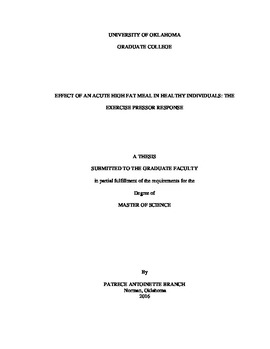| dc.description.abstract | Background: Cardiovascular disease is the number one cause of mortality in the United States which has arose from numerous contributing factors including the westernized diet and its shift toward more fatty and carbohydrate heavy meals. To date, studies have focused on the effects of single high-fat meals on peripheral endothelial function, but have not investigated the effects on the cardiovascular control of blood flow during exercise. Primary Aim: The primary aim of this study was to evaluate the interaction between a single high-fat meal and the exercise pressor reflex. METHODS: Since the exercise pressor reflex is dependent on the activation of both mechanically sensitive and metabolite sensitive receptors we chose a study design that allowed each to be studied in detail. In order to investigate the effects of the meal on the mechanically sensitive receptors, a dynamic handgrip exercise test was conducted at 10, 15, and 20% of each participant’s maximal voluntary contraction with a minute per intensity and a 30-minute rest period before continuing through the protocol. Given the very low exercise intensity the accumulation of metabolites would have been minimal during this type of exercise. Following the rest period, both mechanical and metabolite sensitive receptors were investigated during a static handgrip exercise test at 30% MVC followed by a period of post exercise circulatory arrest in which only the metabolite sensitive receptors would be active. During each exercise test measurements arterial blood pressure, heart rate, the rate-pressure product, and inactive limb vascular resistance were obtained. RESULTS: The high-fat meal had no significant effect on the cardiovascular responses during the dynamic handgrip exercise in comparison to the placebo meal. Conversely, following a single-high fat meal there was a significant increase in the rate pressure product, an index of myocardial work, during the static handgrip exercise test. (p value < .05). There was no other significant response in the other variables measured when comparing the placebo and the high-fat meals during static handgrip exercise. The results found in this study provide insight on how a single high-fat meal can increase the amount of work that must be done by the heart during exercise that stimulates both mechanical and metabolite sensitive receptors within the periphery. This is valuable because it helps to explain how the normal population is effected directly by eating an unbalanced diet which increases the risk of cardiovascular disease. | en_US |
